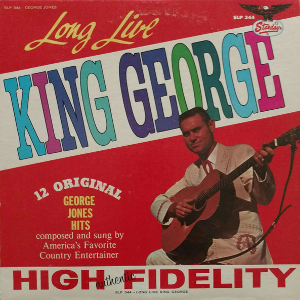Long Live King George
| Long Live King George | ||||||||||
|---|---|---|---|---|---|---|---|---|---|---|
 |
||||||||||
| Compilation album by George Jones | ||||||||||
| Released | March 11, 1965 | |||||||||
| Recorded | August 27, 1955 - April 21, 1958 | |||||||||
| Genre | Country, rockabilly | |||||||||
| Label | Starday | |||||||||
| Producer | Pappy Daily | |||||||||
| George Jones chronology | ||||||||||
|
||||||||||
| Professional ratings | |
|---|---|
| Review scores | |
| Source | Rating |
| Allmusic |
|
Long Live King George is the title of a 1965 country music released by George Jones. The album was long thought to be a studio release, however, it is a late Starday Records compilation of Jones recordings throughout the mid to late-1950's.
The album features many of Jones' early gems, including many of his earliest hits, "You Gotta Be My Baby" from 1956, "Seasons of My Heart" from 1955, and Jones' first chart single "Why Baby Why" in 1955. It even lists a track from his third collaboration attempt in 1957 with Virginia Spurlock titled: "No, No, Never."
In late 1956, there were shakeups in some of the top management jobs in Nashville and part of this realignment saw Starday Records, an independent country music label founded in Houston by Jones's producer and mentor H.W. "Pappy" Daily and Jack Starnes, absorbed into Mercury Records. As Colin Escott writes in the liner notes to the Jones retrospective Cup of Loneliness: The Classic Mercury Years, Daily and Starday president Don Pierce were approached to take over Mercury's country roster to form the Mercury-Starday label but "the clincher was the success of George Jones. After 12 years in the business, Mercury hadn't found one country artist who had promised or delivered half of what George had." By July 1958, Mercury-Starday dissolved with Pierce assuming control of Starday and Jones remaining at Mercury with Daily producing him.
Jones wrote or co-wrote all of the selections on Long Live King George. Two selections, "Nothing Can Stop My Love" and "Tall, Tall Trees", were co-written with Jones's friend Roger Miller, the latter becoming a chart-topping country hit for Alan Jackson in 1995. Jones also collaborated with J.P. Richardson (better known as the Big Bopper) on the upbeat "If I Don't Love You (Grits Ain't Groceries)" (Richardson would also compose "White Lightnin'", which would become Jones's first number one in 1959).
...
Wikipedia
